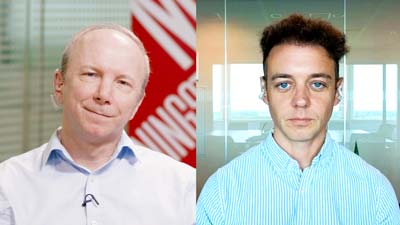Saving money in a stagnant economy is not easy. While the cost of living has risen steadily over the past three years, wages have been frozen and cash reserves eroded by inflation. According to Equifax, two thirds of consumers plan to save more in 2014 and more than 40% want to pay off more debt.

Some of the greatest businesses started in the depths of a recession

New Year is the perfect time to set yourself on the right financial path - with three months until the end of the tax year, investors can get their house in order.
Looking for inspiration? We reveal the financial resolutions of industry experts, from fund managers and equity analysts to financial advisers and consumer watchdogs.
It is said that Michelin star chefs have appalling diets - but can the same be said of financial experts and their own portfolio planning?
Stephanie Flanders, J.P. Morgan Asset Management chief market strategist for Europe and UK
I'm going to remember there is more to life than GDP, and that some of the greatest business success stories started in the depths of a recession. Put it another way, any Greek company that has made it this far is probably worth a second look. I don’t feel very optimistic about the Eurozone from a macro standpoint – the recovery this year is likely to be fragile, at best. But I do think there are pockets of value and excellence and there are sectors and companies that are doing exceptionally well. I’m expecting European stock markets to have a good year in 2014, but investing in a broad index is not necessarily the best way to buy into those micro success stories.
Patrick Connolly CFP, Chase de Vere
My New Year's resolution is to take advantage of low interest rates to repay as much of my mortgage as I can. I'm not entirely confident about the prospects of stock markets in the short term and so I'm in the process of selling some holdings in UK smaller companies, UK equity income and US equities, which I'll use to reduce my mortgage a bit and I've also increased my monthly mortgage repayments.
Andrew Goldberg, J.P. Morgan Asset Management global market strategist
I resolve to look for income and not yield in a world of over-easy monetary policy. Central banks are pushing down long term and short term rates and making it difficult for yield-seekers to make money. You can get income from a lot of different sources like equities – don’t fixate on high yielding securities when central banks are waging war on yield.
Darius McDermott, Chelsea Financial Services
I am going to try to save more for my children. They've both started primary school now and I am not sure whether I might need to pay for private education or not for secondary school so I am making contingency plans now and starting to put a bit more aside. We generally invest a bit each birthday but will be doing a monthly amount from now on.
Fraser Lundie, Hermes head of credit
Fundamentally, default rates should remain significantly below long-term averages for the foreseeable future, meaning that returns will be generated by security selection as much as company selection. Investors must pay as much attention to cash price, call risk and yields as to the more well-known valuation measure of spread. Record-low yields should not be an impediment to investing in high-yield credit – but they do require careful analysis. Paying the right price for the right securities will be crucial to outperforming in 2014.
Adrian Lowcock, Hargreaves Lansdown senior investment manager
In any one given year it is difficult to predict which market will perform best. Spreading your investments into a range of different asset classes and funds makes sense. There are four main asset classes; cash, equities, fixed interest and property, so somewhere between 10 and 20 funds should be enough. Anymore funds and it will reduce the effectiveness of each fund on portfolio performance.




























